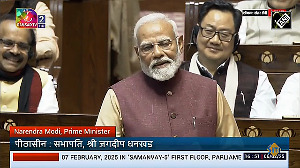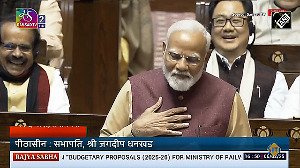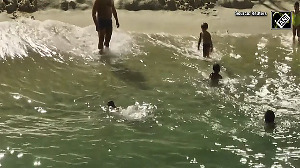B Raman continues his analysis of the Mitrokhin affair, and examines the dubious role played by British intelligence agencies in entire saga.
Part I: The Mitrokhin mystery
What has been the role of MI-5 and MI-6 in this affair?
In the past, the British intelligence was never well-disposed towards the Labour Party and other political leaders and intellectuals to the left of the political spectrum.
During the Cold War years, it used to project the Labour Party as riddled with KGB agents. It even reportedly suspected that then Labour Prime Minister Harold Wilson was a KGB agent. It was never able to prove its allegations or corroborate its suspicions.
In 1992, when the Conservative government headed by John Major was in power, Vasili Mitrokhin walked in with tons of notes kept by him, allegedly showing that many of the Labour leaders whom the British intelligence suspected in the past of being KGB agents were, in fact, KGB agents.
Mitrokhin hardly named any Conservative leader as being in touch with the KGB. It is significant that MI-6 and MI-5, the internal Security Service, did not prosecute any of the persons named by Mitrokhin as KGB agents.
Even a woman civil servant whom he accused of helping the Soviet Union's nuclear programme was not prosecuted. They did not even consider it necessary to interview or question them in order to get their comments on the allegations leveled against them by Mitrokhin.
Instead, MI-5 and MI-6 proposed to Malcolm Rifkind, foreign secretary in the Major government, in 1996 that the notes brought by Mitrokhin should be given to Professor Christopher Andrew for joint publication with Mitrokhin after suitable editing.
MI-6 justified its proposal on the ground that Mitrokhin had agreed to hand over his voluminous notes to MI-6 on the condition that it would help him in getting them published in the UK. Its commitment to him had to be kept. Moreover, the publication would educate the public on how the Russian intelligence operated.
Rifkind approved the proposal and Mitrokhin's notes were handed over to Professor Andrew. But his condition-- that people against whom there was insufficient evidence to warrant a prosecution should not be named in the book -- was violated by the agencies and Andrew.
In the 1997 election, the Conservative government was defeated and a Labour government headed by Tony Blair came to power. MI-5 and MI-6 were put in an embarrassing position.
In October 1997, they casually discussed the case with Robin Cook, the new Labour foreign secretary, without giving him the relevant details. They gave him the false impression that the new Home Secretary Jack Straw had been kept fully informed.
For more than a year, they avoided telling the Blair government about the Mitrokhin papers, which made allegations against many Labour leaders, and about their having handed them over to Andrew for publishing them in the form of a book.
Only on March 22,1999, a few months before the publication of the book, did MI-5 send a detailed note to Cook requesting a reconfirmation of the permission given by the Conservative government to publish Mitrokhin's papers.
Cook was given a false impression that Jack Straw had already agreed to this. Cook permitted MI-5 and MI-6 to go ahead with the publication. When the book ultimately came out, the Labour home secretary and foreign secretary were stunned.
They were unaware that many of the allegations were against members of their own party. They were also ignorant of the fact that while MI-5 and MI-6 did not consider the allegations voiced by Mitrokhin strong and credible enough to warrant action against anybody, they chose to have them disseminated in public through a book written by an academic who was alleged to be an embedded analyst of the intelligence agencies.
The Parliamentary Intelligence and Security Committee to which the matter was referred by the Tony Blair government did not question the decision of the agencies to have the papers published or their decision to hand over the task to Andrew.
It accepted the MI-6 contention that it had to honour its commitment to Mitrokhin to help him get his papers published in the UK. But, it severely criticised the intelligence agencies for the manner in which they handled the case and for their failure to brief the new Labour government fully.
What was Christopher Andrew's role in the controversy following the publication of the first volume of his book in 1999?
Richard Tomlinson, the MI-6 officer who had played a role in the clandestine transfer of the notes kept by Mitrokhin from Russia to London, fell out with the agency and started making allegations that MI-6 had tried to have Colonel Gadaffi of Libya assassinated.
He also started leveling allegations about the role of MI-6 in the supply of chemical weapons to Saddam Hussain during the Iran-Iraq war of the 1980s, its role in the balkanisation of Yugoslavia etc.
When MI-6 tried to have him arrested, Tomlinson fled to Switzerland and from there to Italy, where he started working in a bar. He launched a web site in which he exposed the identities of many MI-6 officers.
On coming to know that he was planning to publish a book containing his allegations against MI-6, the agency exercised pressure on Western publishing houses not to publish his book, threatening them with prosecution under the Official Secrets Act, if they did so.
Finding that no Western publisher would touch his manuscript, he approached a Russian publisher (Kirill Chashin) , reportedly with the help of Nick Fielding of The Sunday Times. Ultimately, the book titled The Big Breach was published by the Russian publishers in January 2001.
MI-5 and Mi-6, with the assistance of the ever-obliging Christopher Andrew, embarked on a campaign to discredit Tomlinson and his book, which leveled serious allegations against MI-6.
The British agencies disseminated stories denying any role by Tomlinson in the clandestine transfer of the Mitrokhin notes from Russia.
The Big Breach was projected as a crude attempt by Russian intelligence to discredit MI-6 in retaliation for the publication of the Mitrokhin Archive by MI-6 with Christopher Andrew's help.
Andrew wrote an article on the subject titled Russia's Revenge in the London Times of February 15, 2001.
Anticipating this campaign by MI-6 against them, the Russian publishers had included in the last chapter of Tomlinson's book a detailed statement on the circumstances leading to the publication of the book.
Thus, we have two books before us. One written by Christopher Andrew jointly with Vasili Mitrokhin, a former low-grade clerk of the KGB archives, accusing the KGB of unethical practices and leveling serious allegations against various people, and the other by an ex-MI-6 officer, who had reportedly played a role in helping Mitrokhin get out of Russia, accusing MI-6 of equally serious unethical practices.
Who should we believe?






 © 2025
© 2025